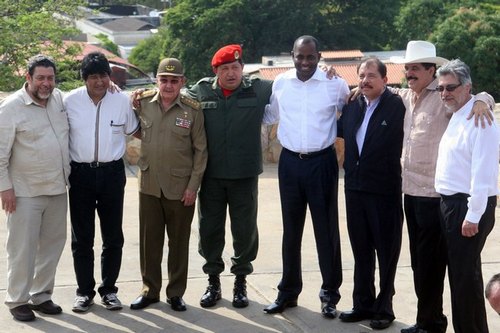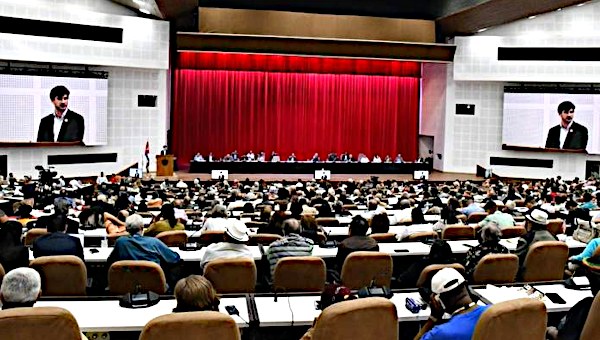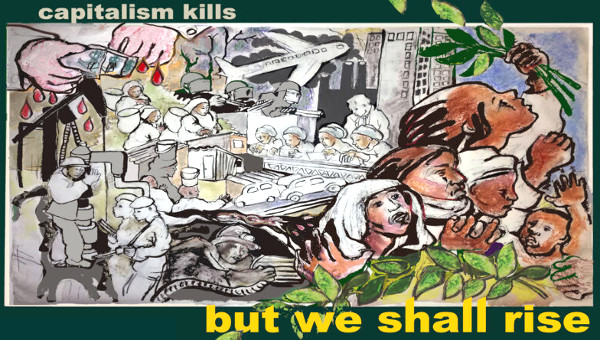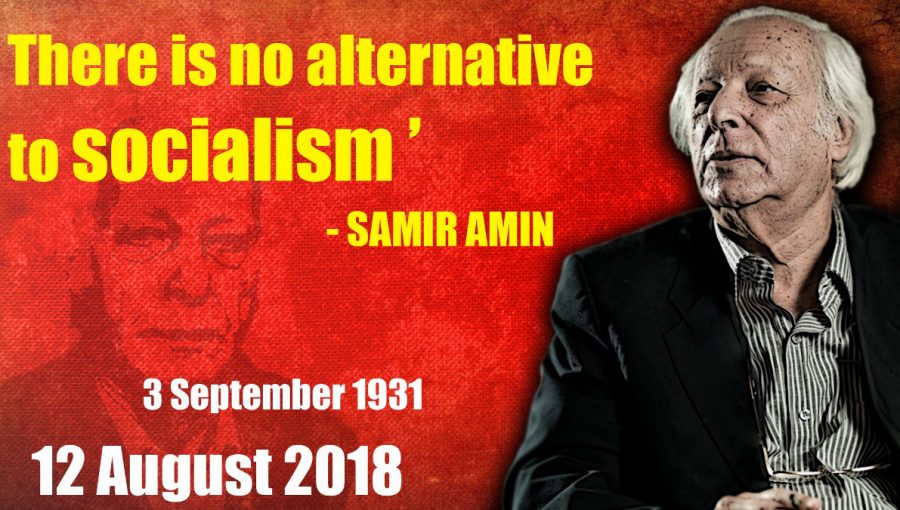The Economic Model Is in Need of Change
That the Latin American Left has been leading the struggle against neoliberalism and beginning the process to define a 21st century socialism is by now hardly a discovery. This last week two more remarkable documents in this political process were released. Both serve as an important counterpoint to the 5th Summit of the Americas over the last weekend, where President Obama of the U.S. and Prime Minister Harper of Canada did their best to sustain North American hegemony over the region and the neoliberal project for the hemisphere.
The first statement was signed by six of the seven members of the Bolivarian ALBA alliance before the Summit (Ecuador was absent but it gave a blistering critique of neoliberal financial policies at the summit itself), and lays out a remarkably different approach to the economic crisis and development in a wide-ranging critique of capitalism. Such a statement from an alliance of elected governments has not been seen in a very long time. It may well take on historical importance.
The second statement comes from the Fourth People’s Summit of the Americas. It, too, rejects the neoliberal model of development and identifies the financial crisis with the social extremes that neoliberalism has encouraged. And it also places a wide range of alternatives to neoliberal policies that would build a new egalitarian sustainable model of development on the agenda.
These are important radical documents. They illustrate the growing opposition within civil society, and indeed several states, to the present world order. They insist that alternatives are not only possible but also must be tried in the present and not in the distant future.
It is imperative that the Left in different parts of the world learn of these documents. It is as crucial that progressive forces in North America begin its own processes and become part of this new emerging Left. As the centre of imperialism and neoliberalism today, this is the special responsibility of the Lefts in Canada and the United States.
Document of the Bolivarian Alternative for the Peoples of Our Americas (ALBA) countries for the 5th Summit of the Americas
Cumaná, April 17, 2009
The heads of state and governments of Bolivia, Cuba, Dominica, Honduras, Nicaragua and Venezuela, member countries of ALBA, consider that the proposed Declaration of the 5th Summit of the Americas is insufficient and unacceptable for the following reasons:
- It offers no answers to the issue of the Global Economic Crisis, despite the fact that this constitutes the largest challenge faced by humanity in decades and the most serious threat in the current epoch to the wellbeing of our peoples.
- It unjustifiably excludes Cuba in a criminal manner, without reference to the general consensus that exists in the region in favour of condemning the blockade and the isolation attempts, which its people and government have incessantly objected to.
For these reasons, the member countries of ALBA consider that consensus does not exist in favour of adopting this proposed declaration and in light of the above; we propose to have a thoroughgoing debate over the following issues:
1) Capitalism is destroying humanity and the planet. What we are living through is a global economic crisis of a systemic and structural character and not just one more cyclical crisis. Those who think that this crisis will be resolved with an injection of fiscal money and with some regulatory measures are very mistaken.
 The financial system is in crisis because it is quoting the value of financial paper at six times the real value of goods and services being produced in the world. This is not a “failure of the regulation of the system” but rather a fundamental part of the capitalist system that speculates with all goods and values in the pursuit of obtaining the maximum amount of profit possible. Until now, the economic crisis has created 100 million more starving people and more than 50 million new unemployed people, and these figures are tending to increasing.
The financial system is in crisis because it is quoting the value of financial paper at six times the real value of goods and services being produced in the world. This is not a “failure of the regulation of the system” but rather a fundamental part of the capitalist system that speculates with all goods and values in the pursuit of obtaining the maximum amount of profit possible. Until now, the economic crisis has created 100 million more starving people and more than 50 million new unemployed people, and these figures are tending to increasing.
2) Capitalism has provoked an ecological crisis by subordinating the necessary conditions for life on this planet to the domination of the market and profit. Each year, the world consumes a third more than what the planet is capable of regenerating. At this rate of wastage by the capitalist system, we are going to need two planets by the year 2030.
3) The global economic, climate change, food and energy crises are products of the decadence of capitalism that threatens to put an end to the existence of life and the planet. To avoid this outcome it is necessary to develop an alternative model to that of the capitalist system.
A system based on:
- Solidarity and complementarity and not competition;
- A system in harmony with our Mother Earth rather than the looting of our natural resources;
- A system based on cultural diversity and not the crushing of cultures and impositions of cultural values and lifestyles alien to the realities of our countries:
- A system of peace based on social justice and not on imperialist wars and policies;
- In synthesis, a system that restores the human condition of our societies and peoples rather than reducing them to simple consumers or commodities.
4) As a concrete expression of the new reality on the continent, Latin American and Caribbean countries have begun to construct their own institutions, whose roots lie in the common history that goes back to our independence revolution, and which constitutes a concrete instrument for deepening the processes of social, economic and cultural transformation that will consolidate our sovereignty. The ALBA-TCP [TCP – Peoples Trade Agreement], Petrocaribe and UNASUR [Union of South American Nations], to only cite the most recently created one, are mechanisms for solidarity-based union forged in the heat of these transformations, with the manifest intention of strengthening the efforts of our peoples to reach their own liberation.
In order to confront the grave effects of the global economic crisis, the ALBA-TCP countries have taken innovative and transformational measures that seek real alternatives to the deficient international economic order, rather than strengthening these failed institutions. That is why we have set in motion a Single System of Regional Compensation, the SUCRE, that includes a Common Accounting Unit, a Payments Clearing House and a Single System of Reserves.
At the same time, we have promoted the establishment of grand national companies in order to satisfy the fundamental necessities of our peoples, implementing mechanisms of just and complementary trade, that leave to one side the absurd logic of unrestrained competition.
5) We question the G20’s decision to triple the amount of resources going to the International Monetary Fund, when what is really necessary is the establishment of a new world economic order that includes the total transformation of the IMF, the World Bank and the WTO [World Trade Organization], who with their neoliberal condition have contributed to this global economic crisis.
6) The solutions to the global economic crisis and the definition of a new international financial architecture should be adopted with the participation of the 192 countries that between June 1 and 3 will meet at a United Nations conference about the international financial crisis, in order to propose the creation of a new international economic order.
7) In regards to the climate change crisis, the developed countries have an ecological debt to the world, because they are responsible for 70% of historic emissions of carbon accumulated in the atmosphere since 1750.
The developed countries, in debt to humanity and the planet, should contribute significant resources toward a fund so that the countries on the path toward development can undertake a model of growth that does not repeat the grave impacts of capitalist industrialization.
8) The solutions to the energy, food and climate change crises have to be integral and interdependent. We cannot resolve a problem creating others in the areas fundamental to life. For example, generalizing the use of agrofuels can only impact negatively on the price of food and in the utilisation of essential resources such as water, land and forests.
9) We condemn discrimination against migrants in all its forms. Migration is a human right, not a crime. Therefore, we demand an urgent reform to the migration policies of the United States government, with the objective of halting deportations and mass raids, allowing the reunification of families, and we demand the elimination of the wall that divides and separates us, rather than uniting us.
In this sense, we demand the repeal of the Cuban Adjustment Act and the elimination of the policies of Wetbacks-Drybacks, which has a discriminatory and selective character, and is the cause of loss of human lives.
Those that are truly to blame for the financial crisis are the bankers that steal money and the resources of our countries, not migrant workers. Human rights come first, particularly the human rights of the most unprotected and marginalized sectors of our society, as undocumented workers are.
For there to be integration there must be free circulation of people, and equal human rights for all regardless of migratory status. Brain drain constitutes a form of looting of qualified human resources by the rich countries.
10) Basic services such as education, health, water, energy and telecommunications have to be declared human rights and cannot be the objects of private business nor be commodified by the World Trade Organization. These services are and should be essential, universally accessible public services.
11) We want a world where all countries, big and small, have the same rights and empires do not exist. We oppose intervention. Strengthen, as the only legitimate channel for discussion and analysis of bilateral and multilateral agendas of the continent, the base of mutual respect between states and governments, under the principal of non-interference of one state over another and the inviolability of the sovereignty and self-determination of the peoples.
We demand that the new government of the United States, whose inauguration has generated some expectations in the region and the world, put an end to the long and nefarious tradition of interventionism and aggression that has characterized the actions of the governments of this country throughout its history, especially brutal during the government of George W. Bush.
In the same way, we demand that it eliminate interventionist practices such as covert operations, parallel diplomacy, media wars aimed at destabilising states and governments, and the financing of destabilising groups. It is fundamental that we construct a world in which a diversity of economic, political, social and cultural approaches are recognised and respected.
12) Regarding the United States blockade against Cuba and the exclusion of this country from the Summit of the Americas, the countries of the Bolivarian Alternative for the Peoples of Our Americas (ALBA) reiterates the position that all the countries of Latin America and the Caribbean adopted last December 16, 2008, regarding the necessity of putting an end to the economic, trade and financial blockade imposed by the government of the United States of America against Cuba, including the application of the denominated Helms-Burton law and that among its paragraphs notes:
“CONSIDERING the resolutions approved by the United Nations General Assembly on the need to put an end to the economic, commercial, and financial embargo imposed by the United States on Cuba and the decisions on the latter approved at several international meetings,
“DECLARE that in defence of free trade and the transparent practice of international trade, it is unacceptable to apply unilateral coercive measures that will affect the well-being of nations and obstruct the processes of integration.
“WE REJECT the implementation of laws and measures that contradict International Law such as the Helms-Burton law and urge the U.S. Government to put an end to its implementation.
“WE ASK the U.S. Government to comply with the 17 successive resolutions approved at the United Nations General Assembly and put an end to the economic, commercial and financial embargo it has imposed on Cuba.”
Moreover, we believe that the attempt to impose isolation on Cuba, which today is an integral part of the Latin American and Caribbean region, is a member of the Rio Group and other organizations and regional mechanisms, that carries out a policy of cooperation and solidarity with the people of the region, that promotes the full integration of the Latin American and Caribbean peoples, has failed, and that, therefore, no reason exists to justify its exclusion from the Summit of the Americas.
13) The developed countries have allocated no less than $8-trillion toward rescuing the financial structure that has collapsed. They are the same ones that do not comply with spending a small sum to reach the Millennium Goals or 0.7% of GDP for Official Development Aid. Never before have we seen so nakedly the hypocrisy of the discourse of the rich countries. Cooperation has to be established without conditions and adjusted to the agendas of the receiving countries, simplifying the procedures, making resources accessible and privileging issues of social inclusion.
14) The legitimate struggle against narco-trafficking and organized crime, and any other manifestation of the denominated “new threats,” should not be utilised as excuses for carrying out acts of interference or intervention against our countries.
15) We are firmly convinced that change, which all the world is hoping for, can only come about through the organization, mobilization and unity of our peoples.
As the Liberator well stated: “The unity of our peoples is not simply the chimera of men, but an inexorable fate” – Simón Bolívar.
Translation by Socialist Voice, based on a translation by Federico Fuentes, Bolivia Rising
The Economic Model That is in Crisis Needs Urgent Change
MESSAGE FROM THE IV PEOPLE’S SUMMIT
to the Presidents gathered at the V Summit of the Americas
As representatives from a wide diversity of trade union, farmer, indigenous, women’s, youth, consumer advocacy, human rights, environmental and, in general, social and civil organizations that are part of hemispheric networks such as the Hemispheric Social Alliance and united here at the IV People’s Summit of the Americas in Trinidad and Tobago, we wish to transmit this message from the people we represent :
1) The Summit of the Americas continues to be marked by exclusion and lack of democracy. First, we consider the continued exclusion of Cuba from hemispheric governmental forums to be inexplicable and unacceptable. No reason suffices to justify this exclusion, especially when nearly all countries of the hemisphere – the only exception being the U.S. – have diplomatic relations with this sovereign nation. We demand the full inclusion of Cuba in all hemispheric spaces in which it chooses to participate and, above all, an end to the illegitimate and unjust blockade that the United States has imposed on the island for decades. [This Summit represents an opportunity for President Obama to demonstrate whether or not he intends to truly change hemispheric relations that have been based on impositions]. For the majority of countries in the hemisphere, we also condemn the near complete lack of channels for democratic participation and consultation on decisions that are made in the official Summit, decisions which will affect the destinies of our nations. This exclusion is one of the reasons for which we are here meeting in the People’s Summit. In this same vein, we want to raise the most energetic protest to the official treatment of our summit, which has included every conceivable obstacle, direct hostility and arbitrary actions that we have had to overcome to make the Summit possible. This has included detentions, deportations, interrogations, mistreatment, spying, denying us the use of facilities and retracting guarantees.
2) In the face of the grave crisis shaking the world and our hemisphere in particular, which illustrates the failure of the so-called “free trade” model it is evident that the official Summit’s declaration is far from representing the indispensible and urgent change that current reality and hemispheric relations demand. We note with alarm that this ‘project’ chooses to ignore the significance of a crisis with such historic dimensions. It is as if by doing this, one could ‘disappear’ the crisis. The official declaration covers with rhetoric, ambiguity, and meaningless good intentions its lack of an urgently needed turnaround in hemispheric policies. What is worse, it insists on proposing solutions that are merely more of the same old policies, more of the medicine that has created the worst illness – in other words, more neoliberalism and free trade. The declaration further ratifies support for antiquated institutions that contributed to the current debacle. Even if by omission, giving forums such as the G-20, which are illegitimate and exclusive, the power to determine so-called solutions to the crisis-such as “prescriptions” to dedicate more resources to the already repudiated IMF-is to maintain a vicious circle. Canceling the illegitimate debts of countries in the South, rather than condemning them to further indebtedness, is a solution that could actually provide countries the resources needed for development.
3) The neoliberal model arose as a “solution” to previous crises, but it has only lead to an even worse crisis. The solution must not be more of the same. We, the social movements and organizations from the hemisphere, affirm that another solution to the crisis is possible and necessary. The solutions will not be found by reactivating the same economic model or establishing an even more perverse one. The solution will not be found in continuing to convert everything – including life itself – into mere commodities. Instead, the solution must be one that puts ‘Living Well’ for all people above the profits of a few. It is not a question of resolving a financial crisis, but rather overcoming all of the dimensions of the crisis – which include the food, climate and energy crises. This requires guaranteeing the people’s food sovereignty, putting an end to the pillaging of the South’s natural resources, paying the ecological debt that is owed to the South and developing sustainable energy strategies. If the governments gathered in the official Summit refuse to explicitly address the urgent changes needed, they thereby renounce their right to receive support from their people. We salute the fact that some presidents from the South are raising with dignity in the official event, alternatives which coincide with those which the people of the Americas are raising.
4) We demand that in the short term, the working people of the hemisphere must not be made to bear the brunt of the crisis, which is what has been happening so far. Instead of dedicating billions of dollars to rescuing financial speculators and large corporations, that profited before the crisis, provoked the crisis, and then returned to the same behavior, we demand that the people be rescued. This is one way to strengthen our national economies and promote recovery directed toward real development that inverts the order of the beneficiaries, giving priority to the people.
5) We also demand that the crisis not be used as a pretext to attack or reduce social rights that have been won. Rights do not have costs. On the contrary, the best solution to the crisis is to expand rights, making decent work, democratic freedoms, and human, economic, social and cultural rights a reality. To start with, the full rights of indigenous peoples must finally be recognized as well as womens’ rights.
6) A just and sustainable solution to the crisis necessitates a complete reorganizing of hemispheric relations and a burial of the so-called “free trade” model. No more FTAs. It is necessary to replace the FTAs that have been proliferating throughout the region with a new model of agreements between nations based on equity, complementary arrangements, mutual benefit, cooperation and just trade. This model must protect the right to development, the right of nations to protect their goods, strategic resources and sovereignty. Processes of regional integration that are developed on these bases are also a strong lever for resolving the crisis and promoting alternative solutions. We especially call on the governments in countries of the South that have advanced these types of processes to deepen them, to not lose their autonomy and to not stray from this path.
Perverse and hegemonic projects such as the FTAA should be buried forever.
We ask governments in the region, namely the new United States administration headed by President Obama, to make explicit their position on the future of initiatives such as the one developed in the entrails of the Bush administration – Pathways to Prosperity in the Americas – that not only aims to revive the corpse of the FTAA, but also to subordinate the rest of the hemisphere to Washington’s policies and security forces. We hereby affirm that we, the people of the Americas, will not allow this to happen.
7) Cooperation between nations must not, in any circumstance, include the militarization of our societies. The security policies of each country must not be subordinated to the interests of any power, nor should human rights and individual guarantees be restricted. We demand the closure of all military bases and the withdrawal of all troops and the U.S. IV Fleet from the waters and territories of Latin America and the Caribbean. The future for our America demands an end, once and for all, with the colonial domination of Puerto Rico and all forms of colonialism in the Caribbean.
Presidents: listening to your people and acting in favor of their interests – not the profits of a small few – is the only true, lasting and sustainable solution to end the crisis and build another, more just America.
HEMISPHERIC SOCIAL ALLIANCE / IV PEOPLE’S SUMMIT OF THE AMERICAS





